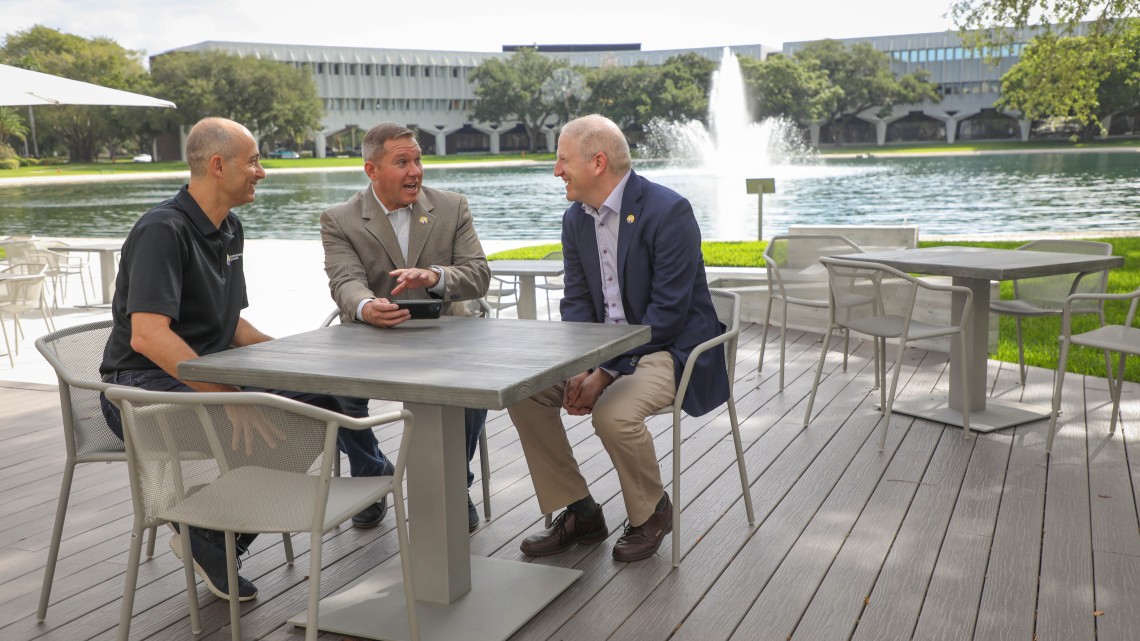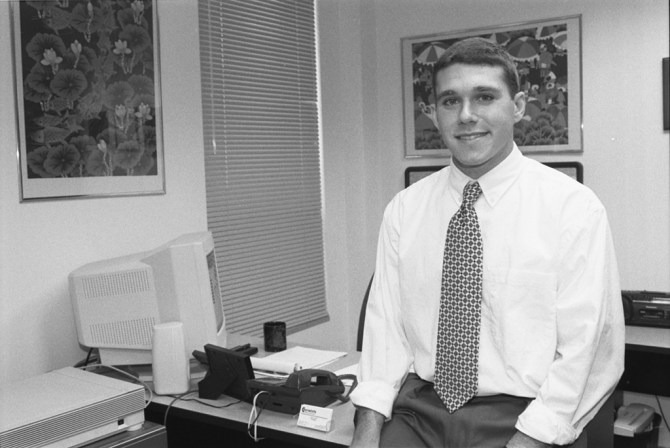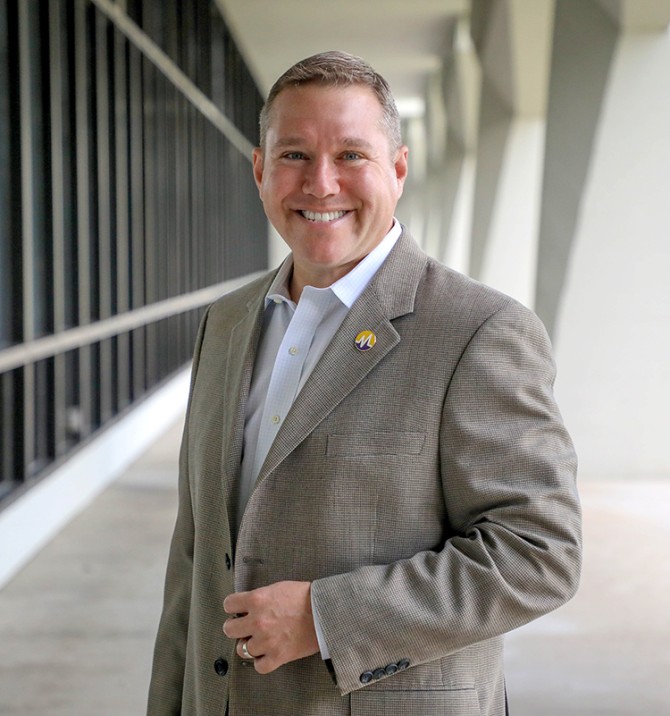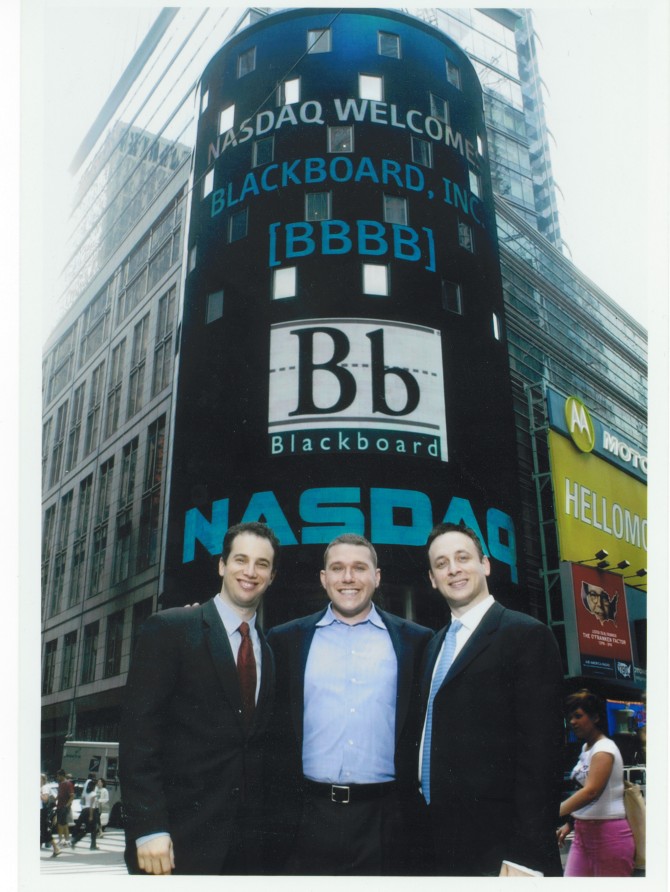
Dan Cane with co-CEO Joe Harpaz (left) and co-founder Dr. Michael Sherling (right) in 2022 at ModMed headquarters in Boca Raton, Florida.
Entrepreneurship Q&A
Cane ’98 makes it his business to improve lives
By Genna Knight
During his sophomore year as a full-time student in Applied Economics and Management at Cornell, Dan Cane ’98 co-founded CourseInfo, LLC, which would become Blackboard, Inc., an online learning platform and global educational technology solution. The idea to digitize his professor’s class materials inspired the business that would quickly turn his housemates into colleagues and his career path into a wildly successful entrepreneurship. In 2011, Blackboard, Inc. sold for $1.6 billion.
Now, as CEO of Modernizing Medicine, an award-winning medical technology company he co-founded in 2010, Cane is working to improve the health care system while continually dedicating time to guide young entrepreneurs. Cane has established the Cane Entrepreneurship Scholars program at the Dyson School to provide financial support, mentorship and experiential learning opportunities for aspiring entrepreneurs at Cornell.
How did your entrepreneurial journey begin?
Like many entrepreneurs, my journey started early in life. It was a lemonade stand, and my parents supported me by providing the ingredients. I quickly figured out that I could add convenience for my customers by simply selling them lemonade packets, which I could provide below market price - until my parents stopped buying the ingredients for me. My more relevant business journey began my sophomore year at Cornell, where, with the support of my dorm-then-housemates, we founded CourseInfo, LLC, which became Blackboard, Inc. in 1997.
What problem does your business solve?
Today, I am the co-founder and CEO of ModMed, where we empower medical practices to grow and scale by delivering better patient experiences with cloud, data, and AI technologies. Leveraging extensive clinical outcomes data, we design intelligent software solutions that simplify, automate, and streamline clinical workflows and drive practice efficiency. With our specialty-specific EHRs, practice management, revenue cycle management, analytics solutions, and products for patient engagement, payment processing, and marketing, we are trusted by over 35,000 providers throughout the US to drive clinical and operational success. Said more simply, we use technology to try and fix a broken healthcare system.
Did you intend to become an entrepreneur when you started at Cornell?
Entrepreneurs are built, not born. I didn't know what I wanted to do when I first started at Cornell, but I knew I wanted to combine my passion for technology with purpose. I started at the School of Arts and Sciences studying economics and later transferred to study agricultural economics at CALS (now Dyson), as it offered a deeper understanding of an entrepreneur's tools to succeed. By the end of my sophomore year, CourseInfo was a growing business, so, like it or not, I had to learn how to scale a company.
Entrepreneurship is all about taking calculated risks. What’s the most pivotal risk you’ve taken, and how did it change your path?
So much in life is all about risk-reward tradeoffs. Most students coming out of university should have a very high tolerance for risk, as that period in life is very forgiving. I was used to eating Ramen noodles and drinking cheap beer. I didn't have a family depending on me. It was the perfect time to start a company. The single most important risk that led to the creation of Blackboard was actually something other than my risk. My best friends and housemates were my co-founders. As we moved closer to graduation, they all had jobs lined up in their respective fields of consulting, computer science, and material science. We believed in each other, and if they had not turned down their job opportunities to take the risk with me, Blackboard would not exist. Their taking a risk on our startup changed my path forever - and I'm eternally grateful.
How has your experience at Cornell impacted how you approach business?
Cornell's students were my co-founders. Cornell's classes were my education. Cornell's professors were my clients. Cornell was a living lab for Blackboard. I use lessons learned from my time at Cornell daily. More than just the quality of the education - the quality of the experience changed me. Most importantly, the people I met and continue to meet at Cornell are cut from a different cloth.
Was there a particular faculty member or class that influenced you the most? If so, how?
CourseInfo was founded in Dr. Cindy van Es's Business Statistics class - ARME310. She was fond, at the time, of dual overhead transparency projectors. She took a chance on me and offered to let me digitize her syllabus, class notes, answer keys, etc, on a novel invention in 1996 - the World Wide Web. Her feedback shaped the product, which became Blackboard. I'll never forget sitting in Warren B45 (since renamed - how dare they!), thinking, "There has to be a better way" to take notes and learn business stats.
What has been your proudest moment as an entrepreneur? Why?
My proudest moment as an entrepreneur was helping to take Blackboard public on the Nasdaq on June 18, 2004. It took years of work and hundreds of mistakes and recoveries to scale to become a publicly traded company. At that moment, the equity became very real for the employees and, most importantly, for my best friends who believed in me.
If you had one piece of advice for someone just starting out, what would it be?
Some things in life are dictated by life itself and are out of your control, but the most important thing you can do is choose who you surround yourself with. You choose your friends. You choose your spouse. You choose your leadership team. Make good choices.
Cornell’s expertise in research, technology and business education translates into meaningful impacts in communities around the world. Our mission extends beyond the classroom, helping entrepreneurs access the research and mentorship they need to start and grow successful businesses. Learn more.
Media Contact
Get Cornell news delivered right to your inbox.
Subscribe

